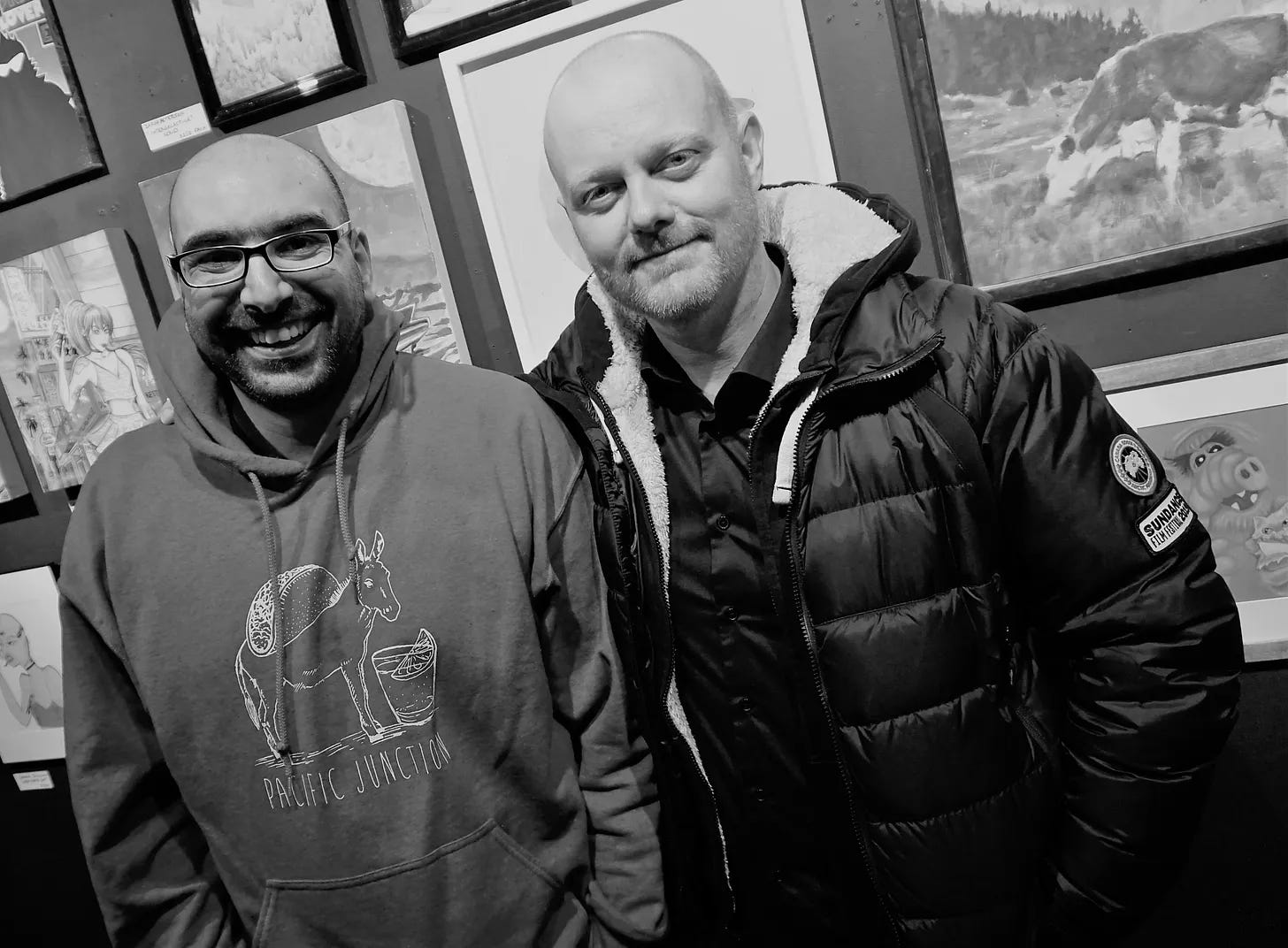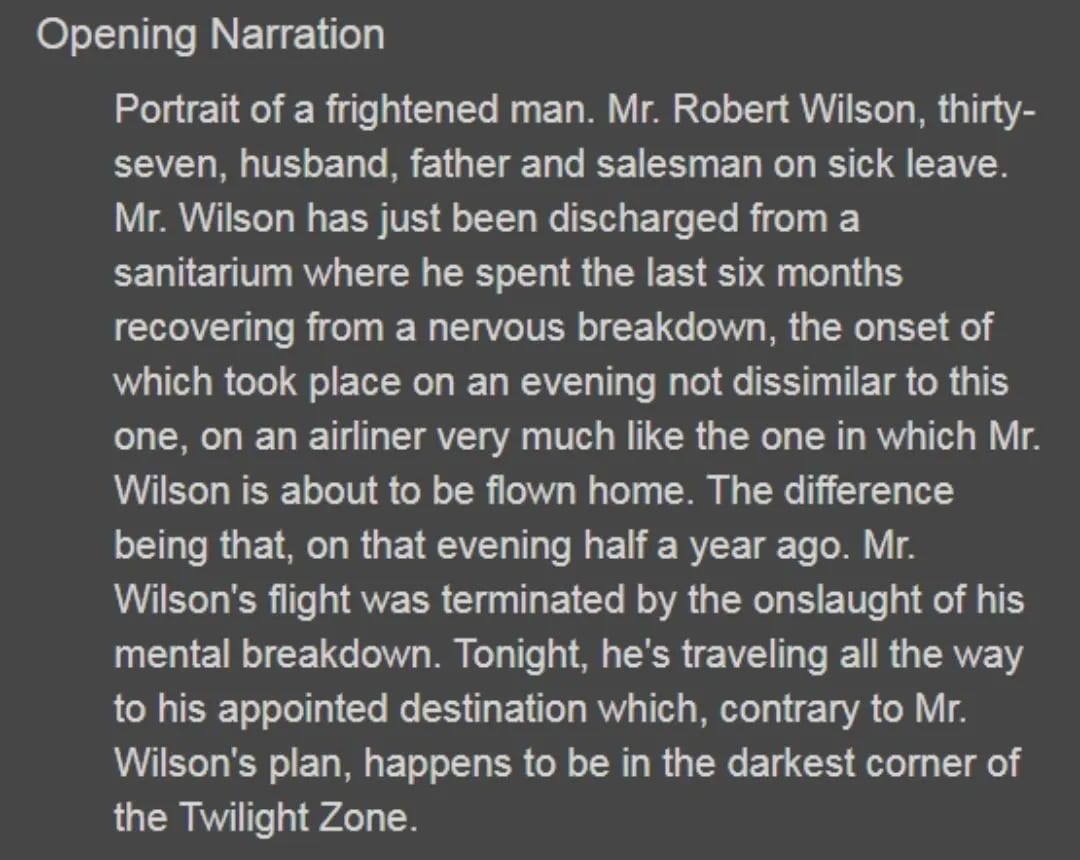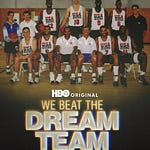Yo…
Chapter 1: A First Perspective
William Shatner attempting to explain seeing Earth from space...trying to convey how big and how fragile this planet (our planet!) truly is...is known as The Overview Effect.
“The overview effect is a cognitive shift in awareness reported by some astronauts during spaceflight, often while viewing the Earth from outer space.”
The Overview Effect is heartbreaking because you see this big blue ball we call home and you realize there’s so much needless suffering due to environmental degradation and social inequality. It’s not a local perspective. You see…humanity and suffering.
Perspective changes everything.
You know this if you’ve gone up to the top of the Space Needle or CN Tower or Empire State building. Perspective changes everything.
On October 13, 2021 after landing back on Earth following his Blue Origin sub-orbital spaceflight Shatner reflected on the experience and told ABC News: “I hope I never recover from this.”
Star Trek is closing in on 60 years and we’ve never truly recovered from meeting Captain Kirk and his weird crew in 1966. A five year mission has turned into decades of mapping the stars and seeking delight in this strange and vast universe.
“In the 58 years since, the Star Trek galaxy has logged 900 television episodes and 13 feature films, amounting to 668 hours — nearly 28 days — of content to date.”
Shatner appeared in two episodes of The Twilight Zone: Nick of Time (1960) and Nightmare at 20,000 Feet (1963).
Nightmare is one of my all time favourite episodes. Yes, the creature on the wing. Shatner played a man trying to recover from a nervous breakdown. “I hope I never recover from this.” Indeed.
I forgot how darkly grim and solid the opening narration of Nightmare at 20,000 Feet is: “the darkest corner of The Twilight Zone.”
Yo...smell ya later William Shatner. Here’s the entire Rod Serling narration:
William Shatner has been with us, forever.
He’s like the Sun and the moon there’s never been a time where he wasn’t there. He’s always there. T. J. Hooker. Boston Legal. TV commercials. He’s always been around.
But not for much longer...he is 93.
This Legion M documentary William Shatner: You Can Call Me Bill isn’t a documentary it’s a memorial. It gives you the opportunity to say thank you for all the adventures. To toast the fun. And remember the laughs. Airplane II: The Sequel is magic.
You Can Call Me Bill is directed by Alexandre Philippe who has directed nerdy docs on the Xenomorph…Memory: The Origins of Alien and 78/52 on Alfred Hitchcock’s Psycho shower scene. (Yes, just the shower scene. Not the entire movie.)

I sat down with William Shatner to talk about life and love...and being curious. You Can Call Me Bill isn’t a Star Trek documentary.
You Can Call Me Bill is about hope and delight...being creative. And doing good work. You Can Call Me Bill is the true story about a kid who grew up in Montreal and ended up in space.
Perspective changes everything.
Attached is my conversation with Alex sharing his perspective on making William Shatner: You Can Call Me Bill.
You Can Call Me Bill is now playing at Hot Docs cinema in downtown Toronto and at select AMC Theatres in the United States of America. It is #PantsWorthy.
Chapter 2: Second Chances
In William Shatner: You Can Call Me Bill there’s a powerful...powerful moment. Shatner is talking about the death of Kirk in Star Trek: Generations, a 1994 sci-fi movie.
“There was a closeup of me as Kirk dies. I wanted Kirk to die the way he lived...with courage. Cause I always played Kirk with curiosity. I wanted that to be his death. And...I wish I’d had another take at it.”
~ William Shatner
That’s a 93 year old actor reflecting on his on-screen death...longing for one more take.
Knowing that in life you don’t get a second take. Second chances, sure but no second takes.
This ain’t a dress rehearsal this...is it. This life is all you get.
Alright: let’s get into: I got Star Trek feelings to share and emotions to unpack.
Chapter 3: The Third Degree…
On March 27th Variety published a fascinating Star Trek report card: The Future of ‘Star Trek’: From ‘Starfleet Academy’ to New Movies and Michelle Yeoh, How the 58-Year-Old Franchise Is Planning for the Next Generation of Fans.
I’ve been with Star Trek since Captain Kirk. As a kid I didn’t always grasp all the social commentary or political nuance: like Klingons represented the American fear of Cold War-era Russians.
I was a simple child. It was a space ship and it was science fiction and it was exploring and danger and no-win situations. Not every episode was Must See TV; I didn’t always #SetTheVCR. But when I found it on some random channel at some random time…I stayed.
(I did the same thing with Doctor Who in the ‘80s, mostly Tom Baker episodes. TVO broadcast Doctor Who from 1976 starting with The Three Doctors and continued with the rest of the original series on a weekly basis until 1990. I’d stumble upon Doctor Who and I had no clue what was happening. It was British and time travel and the long scarf and evil aliens and more. I was a simple child.)
When Star Trek: The Next Generation began airing on September 28, 1987, I became a faithful viewer. I watched every week. The first couple of seasons (like The Simpsons!) were rough…it was trying to be old school at the same time it was a new show.
However, a glimpse of the future: the 16th episode of the second season was Q Who: “Q (John de Lancie) flings the Enterprise 7,000 light years beyond Federation space and into a confrontation with the deadly Borg.”
Q and the Borg…in one glorious episode? Okay…you have my attention. This is a fantastic yet horrifying first contact.
This special episode was the 42nd of the series.
42 of course has mucho sci-fi value: 42 is the Answer to the Ultimate Question of Life, The Universe, and Everything. 42 is life, according to Douglas Adams in The Hitchhiker’s Guide to the Galaxy. And oh, how the Borg and Q would provide us all with so much life over the next few decades.
When Next Gen concluded, I tried and struggled with Deep Space Nine. (Far Beyond the Stars is a stunning episode.) Deep Space Nine were ill-fitting clothes. It’s not for me.
What followed next was Voyager and that was tailored made for my heart. I’ve watched the entire series five times. When it was on I did my best to evangelize and spread the good news.
And then…Voyager concluded on May 23, 2001. There were movies and such but the weekly TV visits those were now absent.
Truthfully, I miss Star Trek: It’s like an ex, now.
Next Gen was thrilling and Voyager was fantastic. We had some good times. And then...I was basically abandoned. “Is this a break or a break up?”
Currently: I refuse to watch any pre-Kirk Star Trek.
There’s no value/benefits in that.
Plus my concern is dumbing down the continuity is designed to draw a less educated audience. I understand but refuse to accept the economics of diluting dense continuity so younger fans are less intimidated by 60 years of stories. Yeah, no.
Comics does this as well with cheap renumbering. It’s insulting and condescending to old-heads. It’s the nerd version of talking loudly to a blind dude.
If you want to be a new fan: great. Welcome. Here’s your nifty nerd-homework...get to work:
“In the 58 years since, the Star Trek galaxy has logged 900 television episodes and 13 feature films, amounting to 668 hours — nearly 28 days — of content to date.” Exactly.
Put in the time and effort.
Close your mouth and open your mind.
It’s the universal standard for every single nerd IP: it’s 2024: get to work.
I know a 12 year old on Season 3 of The Simpsons. Good; keep going...you got over 30 more seasons to go. Better make some strong coffee son or crack open a Red Bull.
So my personal and protective policy was clear. No to: Enterprise, Discovery, J.J. Abrams’ Star Wrecked and Strange New Worlds.
Because it moved the story forward I watched all 3 Picard seasons. Which was wildly uneven. What was the point of Season 1? How did this add depth to a layered and well-defined character?
Nostalgia neutralizes quality. Like...what are we doing here?
The primary reason the recent Picard series had success (however you define success) is because Next Gen put in time at the office and created 178 episodes. They crafted a large cultural footprint.
Most TV writing is simply not good enough for a puny 10 episode season. These shorter TV seasons are a measly weekend in Australia; that’s a super long way to go for just a short amount of time.
X-Files put out 20 episodes or more a season with a captivating mix of Monster of the Week and the larger government conspiracy episodes. Supernatural did that as well for a while before succumbing to dense long-winded mythology.
We’re clearly not going back to any of that which sucks because what we’re being offered isn’t working.
The Variety article correct points out the fans are not getting any younger. Casually from the conventions I attend that seems obvious. Still, Jonathan Frakes in the article says: “Star Trek fans, as we know, are very, very, very loyal — and not very young.” Yeah, no guff.
How do you effectively draw fresh fans while maintaining a brassy continuity and prolonging the integrity and quality that are the hallmarks of previous noble incarnations?
How do you avoid combative comprises that neutralize hope and suffocate delight?
Because at the end of the day this is just supposed to be wild fun.
And as much as I miss Star Trek I miss that fun and surprise as well.
Every week the crew and I issued a simple request: show me something cool. And thankfully our universe is so vast it does not disappoint.
May we boldly go…again real soon.
Wearing A Red Shirt When He Beams Down…
Sammy Younan
-28-
Sammy Younan is the affable host of My Summer Lair podcast: think NPR’s Fresh Air meets Kevin Smith: interviews & impressions on Pop Culture.













Share this post